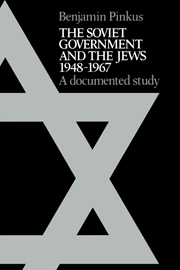Book contents
- Frontmatter
- Contents
- List of tables
- List of documents
- Preface
- Acknowledgements
- Note on transliteration and style
- Introduction
- Part I Government ideology and the Jews
- Part II Jews as victims of Soviet policy
- 3 Anti-Semitism in the Soviet Union
- 4 The campaigns against ‘Jewish nationalism’ and ‘cosmopolitanism’
- 5 Jews on trial in the Soviet Union
- Part III The Zionist issue
- Part IV Jews and the Jewish people in Soviet society
- Part V The Jewish experience as mirrored in Soviet publications
- Part VI A separate development
- Notes
- Glossary
- Select bibliography
- Index
4 - The campaigns against ‘Jewish nationalism’ and ‘cosmopolitanism’
Published online by Cambridge University Press: 05 April 2012
- Frontmatter
- Contents
- List of tables
- List of documents
- Preface
- Acknowledgements
- Note on transliteration and style
- Introduction
- Part I Government ideology and the Jews
- Part II Jews as victims of Soviet policy
- 3 Anti-Semitism in the Soviet Union
- 4 The campaigns against ‘Jewish nationalism’ and ‘cosmopolitanism’
- 5 Jews on trial in the Soviet Union
- Part III The Zionist issue
- Part IV Jews and the Jewish people in Soviet society
- Part V The Jewish experience as mirrored in Soviet publications
- Part VI A separate development
- Notes
- Glossary
- Select bibliography
- Index
Summary
Attacks on nationalism
The basic contradictions inherent in the Soviet solution to the national problem have always necessitated a constant struggle against any sort of ‘nationalist’ deviation. However, the campaigns against nationalism have varied radically over time in content and aim. For a long time, Soviet leaders and theoreticians differentiated (and, in theory, still differentiate today) between ‘Great Russian nationalism’ and ‘local nationalism’. Their concern with this problem notwithstanding, the authorities began to wage the struggle against the former deviation with any degree of vigour only in the 1920s. It slackened off in the first half of the 1930s, coming to a complete halt in the second half of that decade. However, the struggle against local nationalism – which came to be designated by the even stronger term ‘bourgeois nationalism’ – has been carried out intermittently from 1917 until the present day.
Jewish Communist leaders, who had headed the Evsektsiya for many years, were among those purged from the national cadres in the 1930s. But this campaign of liquidation, which objectively speaking dealt a fatal blow to Jewish national existence, was not directed against them as Jews; in this case, the policy aimed to liquidate the leading cadres of all non-Russian nationalities (the Jews included). As will be seen below, the period after World War II differed in this respect, since the campaign against nationalist deviations and all foreign influence then began to assume a thoroughly anti-Jewish character.
- Type
- Chapter
- Information
- The Soviet Government and the Jews 1948–1967A Documented Study, pp. 147 - 192Publisher: Cambridge University PressPrint publication year: 1984
- 1
- Cited by



